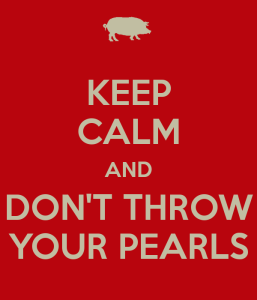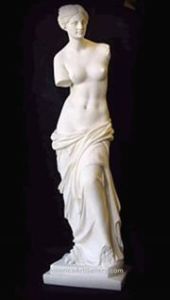Relational Sanity Pt 2: Stop throwing your pearls!
Had a bad dream last night.
.
I was with a group of people who I love very much. And in their eyes, I couldn’t do anything right. Whatever I said was wrong. People who should have been supportive were critical. I was in a no win situation, and I decided to make it worse by getting angry about it, and by getting resentful. No matter what I did, even if it was what they wanted from me, it wasn’t good enough. The feeling I had inside was hopeless and excruciating because I knew that no matter what I did, it would never be good enough for them. But I got so angry and hurt, and I was so overcome by my powerlessness to be good enough, that I ruined the food I was preparing, perfectly good food, but my focus was on people who could not be pleased.
.
I am taking the warning for exactly what it is. In the dream, I started out preparing the food they wanted from me, which was not clean, and far later in the dream I ruined the good food in my anger. Their reaction was the same no matter what I was giving them — no matter how hard I was trying and no matter how badly I wanted them to love, accept or understand me.
.
Here’s the deal. I ruined that good food because I wanted something that others were not willing to give me. And from time to time we have to take stock of our lives and see that there are going to be people in our lives for whom nothing will ever be good enough. It is going to hurt, but when it happens we have a choice to make. Are we going to focus on gaining that approval, which we will never have unless they do the hard work of changing, or are we going to keep our focus on God?
.
It’s one of the hardest lessons in life, persevering through disapproval. But it is one of the things we must learn to do before we can even hope to call ourselves mature. It’s okay to want to be approved of if it drives us towards doing what is good, but it’s not okay to seek approval when it is not within our power to get it or when it pushes us towards doing evil.
.
There are people in our lives who are always going to be…. well…. swine. We toss what is precious to us at them, hoping they will see and admire it, and they turn and trample our precious things and then tear us to shreds. But in general, we knew that they would do it when we tossed those pearls. We knew it. And we did it anyway, treating those people like mini-gods, like idols — like somehow their approval was worth having.
.
But no matter how much we love people, if they are determined not to approve of us and if nothing we do will ever be good enough then we have to take stock of the situation.
.
Do we have a relationship with those people or do we have a house of cards built out of hopes, dreams, and wishful thinking? And why do we want the approval of the sort of person who does not wish to approve of us? There is a big difference between someone who wants to approve, but because of the way we are living, cannot. That is understandable. But this desire to have approval from people who are, for all intents and purposes, bullies (whether they mean to be or not) – it’s putting our focus on something unrighteous and it can be a form of idolatry. Unrighteous because it clouds our vision and makes us compromise, like kicking against a rock wall with your bare foot. The wall might be amused with your efforts, might enjoy the attention, but will probably just end up complaining about the mess your blood is making on its pristine stones. Idolatry because we have to take our focus off of our Heavenly Father in order to concentrate on them.
.
It isn’t their absolute obligation in life to approve of us, or agree with us, or even tolerate us — and they know it. They know it. That knowledge gives them power and authority over us if we allow it. And sometimes even when it is their obligation to love us, they recognize the autonomy that gives them the right not to. They aren’t puppets, and they realize that they have the right to deny us all the things we want them to give. When we persist, we are feeding our energy into a power game that we hold none of the pieces to. They are going to win the game, unless we stop playing.
.
So when will we figure it out?




